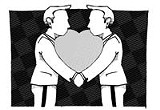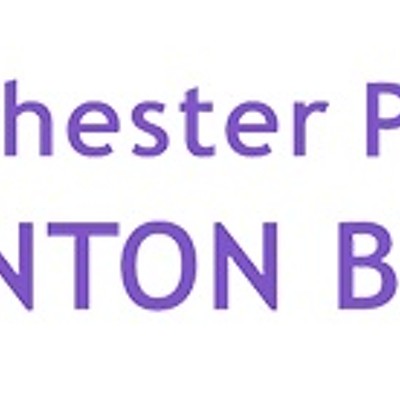What marriage means to New York
A state bill to outlaw same-sex marriages could still come to a vote
By Erica Curtis[
{
"name": "500x250 Ad",
"insertPoint": "5",
"component": "15667920",
"parentWrapperClass": "",
"requiredCountToDisplay": "1"
}
]
Several issues were left hanging when the state legislature adjourned last week. But there is probably one bill you won't see on the lists of things yet to be decided: the Defense of Marriage Act.
DOMA is a bill, not yet voted on, to outlaw the marriage of gay or lesbian couples in New York State. And though it might be lost in the talk over the state budget, the war over who can legally marry, and who can prevent marriage, is waging.
"It is a LGBT issue, but on a broader scale it isn't," says Lynn Tavernese, community relations director at the Gay Alliance of the Genesee Valley. "It's really everyone's issue. Do we have the right to impose a second-class citizenship on people? It should be everyone's fight, not just the gay community's."
DOMA, in its various iterations, is not new. The federal government passed a national Defense of Marriage Act in 1996 --- which denied same-sex couples federal benefits and gave states the right to decide their own positions. Forty US states have passed some sort of legislation restricting legal marriage to heterosexual couples. New York State's version of the bill has been languishing in committee since its drafting in 1999.
But the Gay Alliance of Genesee Valley says that there is new reason for concern: The bill's sponsorship in both the Senate and the Assembly has been rising, and the list includes some local legislators. Senator George Maziarz is a sponsor, and Senator Jim Alesi signed on June 16.
When news of Alesi's sponsorship reached the Gay Alliance, it launched an invigorated campaign against the bill, urging voters to voice their opposition.
"It's really disappointing that Alesi would co-sign this bill," Tavernese says. "Because what he's actually done is turn his back on 10 percent of his constituents. Right now they're saying for every one call that is against voting for DOMA there are 10 calls from the religious right that are pushing it. We have to call Alesi to say 'shame on him, we don't want it.'"
DOMA did not reach the floor for a vote before the legislature adjourned, but that doesn't spell victory to the bill's opponents.
"If they come back to talk about the budget, they could vote on DOMA," Tavernese says. "If they go back into a session they could bring it up again. The most important thing is that we can't become complacent. It's still alive and could go."
Ross Levi, director of public policy and governmental affairs with the Empire State Pride Agenda, says the same.
"The bill remains introduced and will be alive up until January 1, when all bills die. Technically, whenever Albany is in session the bill can be acted upon. I think the political pressure behind the bill may go down some the closer we get to the [presidential] election. But we must remain vigilant."
Levi, who works in Albany, wants the LBGT community to be at least as vocal as the opposition.
"There was a group of about 400 people here a few weeks ago, in Albany, rallying for passage of DOMA," he says. "It would be a mistake for anyone to be complacent and assume DOMA is dead for good."
Neither Alesi nor Maziarz could be reached for comment on their support of the bill. And in a recorded statement on Alesi's website, he prioritizes resolving the budget over legislating on gay marriage.
"But as it stands right now," his message says, "I believe that the issue of marriage, at least in New York State, is defined as between a man and a woman. And I think that's the position we have to maintain, until and unless there is an active legislation or judicial approach to this issue."
Keeping marriage between a man and a woman --- a phrase from the anti-gay-marriage camp --- makes it sound like DOMA would keep marriage neat and tidy. But proponents of gay marriage say the legislation is an intrusion on civil rights and unnecessarily and unfairly complicates the lives of same-sex couples who wish to be married.
The text of the New York State DOMA bill says that "a marriage or union is absolutely void if contracted by two persons of the same sex, regardless of whether such marriage or union is recognized or solemnized in another jurisdiction."
Nearly 44,000 New York State same-sex households identified themselves in the last US census. "There were some in every county here in New York State, so we truly are everywhere," Levi says. "One in four of those families are raising children, with an average of two children per household." And he believes the statistic is underreported.
If DOMA became law, those families "would be told, officially, in law, that they are not worthy of the same rights and responsibilities that every other family in New York gets with marriage," Levi says.
A couple is imbued with 700 rights and responsibilities when they are married in New York State, Levi says. These rights and responsibilities govern the couple's legal status in meticulous and sometimes arcane detail. Rights range from the right to make medical decisions for a spouse, the right to adopt, the right to get death and other benefits, the right to visit each other in the hospital, and the right to inherit a liquor license. Responsibilities under the law include divorce, child and spousal support, and reporting full family income.
"Marriage affects just about every section of NY law," Levi says.
When New Paltz Mayor Jason West started marrying same-sex couples in March, Attorney General Eliot Spitzer issued a statement advising him and other officials to stop. According to Spitzer's interpretation of the law, the state is not allowed to issue marriage licenses to same-sex couples. But, also according to Spitzer, New York State court precedent dictates that same-sex marriages and civil unions performed in other states should be recognized in New York. Even further: "The exclusion of same-sex couples from eligibility for marriage, however," Spitzer wrote, "presents serious constitutional concerns."
Levi sees this as evidence of New York's "long history of recognizing marriages from other jurisdictions, even ones that would be illegal here."
Vermont performs civil unions for same-sex couples, and a New York State trial court recently upheld the legality of a Vermont civil union. Massachusetts is the only state that performs marriages for same-sex couples. But there is some question as to the legality of those marriages in New York State.
Governor Mitt Romney of Massachusetts recently allowed the marriage of same-sex couples in his state with one, fairly major, limitation. Citing a 1913 law originally intended to prevent interracial marriages, Romney has said that same-sex marriages that are void in a couple's home state are also void in Massachusetts. So, according to the Massachusetts governor, no same-sex couple from any of the other 49 states (none of which perform same-sex marriages) can be legally married in Massachusetts. (Some Massachusetts city clerks have chosen to ignore him on this point.)
The question that remains, Levi says, is whether same-sex marriages are actually void in New York. One New York court and the Attorney General have said that same-sex marriages performed elsewhere need to be recognized by the state.
"How could it be recognized and void?" Levi says.
Marriages performed in Canada are more often considered valid by New York, Levi says, because Canada has no legal restrictions on same-sex marriages. Five state jurisdictions recognize Canadian same-sex marriages and allow couples married in Canada access to those jurisdictions' marriage rights. Rochester is one of them.
This is where DOMA comes in: If it became law in New York State, the legality of all same-sex marriages, regardless of where or when they were performed, could be up for debate.
"DOMA could very well counter the Attorney General's decision and that trial court's decision that a same-sex couple that had been married in Toronto is fully married here," Levi says.
But this is all new ground, Levi says. These decisions will most likely need to be taken to the courts.
Opponents of DOMA do not believe the bill has a strong chance in the Assembly, even if it does pass the Senate.
"I have a hard time imagining the Assembly taking on a bill like this," says Assemblyman Joe Morelle. "We have colleagues we value very highly that are gay or lesbian."
Morelle says he hopes that "over time this kind of legislation will be unnecessary."
Tavernese agrees that DOMA passing in the Assembly is unlikely. But she says that right now, "It's really a wait and see." As part of Rochester Pride Week, a Gay Alliance-organized Toronto Marriage Day Trip, via the fast ferry, will go off as planned on July 15.
Speaking of Defense Of Marriage Act, New York State
Latest in News
More by Erica Curtis
-
What's in the water?
Jun 14, 2006 -

Roses are red
May 3, 2006 -

As American as pasta e fagiole
Mar 22, 2006 - More »









